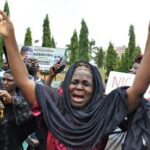Award-winning rapper Nicki Minaj has publicly endorsed former United States President Donald Trump’s claims that Christians are being persecuted in Nigeria, sparking renewed debate over the nature of violence in Africa’s most populous country.
Speaking on Tuesday at a US-organised event, Minaj said, “In Nigeria, Christians are being targeted. Churches have been burned, families have been torn apart simply because of how they pray.” Her remarks echoed recent statements by Trump, who has threatened to send American troops into Nigeria “guns a blazing” if the government “continues to allow the killing of Christians.”
However, analysts and government officials say there is no evidence that Christians are being systematically targeted on the basis of their faith. Instead, they point to a complex security crisis driven by jihadist insurgencies, rural banditry, criminal networks, and long-standing clashes over resources such as land and water.
Nigeria’s government swiftly responded, calling Minaj and Trump’s claims “a gross misrepresentation of reality.” While acknowledging widespread violence, officials stressed that “terrorists attack all who reject their murderous ideology, Muslims, Christians and those of no faith alike.”
Independent monitors similarly note that most victims of jihadist groups in the north are Muslims. Analysts say attacks often stem from competition over scarce resources, ethnic tensions, or criminal motivations, rather than religious persecution.
Minaj, whose real name is Onika Tanya Maraj-Petty, insisted her stance was not about taking sides. “This is about standing up in the face of injustice. It is about uniting humanity,” she said, standing beside US Ambassador to the UN Mike Waltz. She thanked Trump for “prioritizing this issue and for his leadership,” and also gave a nod to her Nigerian fanbase, calling the country “a beautiful nation with deep faith traditions.”
Waltz praised Minaj for “leveraging her massive platform to spotlight the atrocities against Christians in Nigeria,” despite the ongoing dispute over how the violence should be interpreted.
The discussion gained new urgency after police in Kwara state confirmed a deadly attack on a church in the town of Eruku on Tuesday. Gunmen identified by residents as bandits opened fire during an evening programme, killing two people and abducting several others. CCTV footage circulating online shows worshipers scrambling for safety, including an elderly woman desperately trying to escape the assailants.
While such attacks do occur, researchers stress that they are part of a wider pattern of violence affecting communities across religious lines. For months, right-wing commentators in the United States have claimed that Islamist militants are systematically targeting Christians in Nigeria, but investigations by the BBC and other organisations have found that much of the data behind these claims is incomplete or difficult to verify.
Nigeria, a nation of more than 220 million people, is nearly evenly split between Christians and Muslims. Most violence occurs in the predominantly Muslim north, where jihadist groups like Boko Haram and the Islamic State West Africa Province operate. Analysts say both Muslims and Christians are frequently victims of these groups, and motivations for attacks are often far more complex than religious identity alone.
The controversy highlights how Nigeria’s security crisis is increasingly reflected in global political debates, even as those on the ground continue to suffer the daily consequences of banditry, insurgency and intercommunal conflict.













Leave a comment